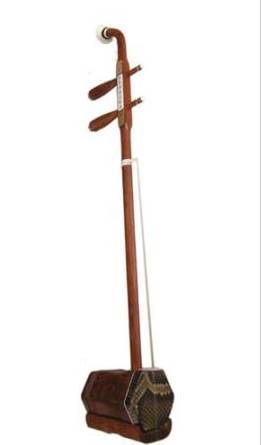Difference between revisions of "Erhu"
imported>Ciic |
|||
| Line 1: | Line 1: | ||
| + | [[File:Erhu.jpg|thumb|Erhu]] | ||
'''''Erhu''''', a two-stringed fiddle, is one of the most popular Chinese instruments in the ''[[huqin]]'' family. | '''''Erhu''''', a two-stringed fiddle, is one of the most popular Chinese instruments in the ''[[huqin]]'' family. | ||
| Line 4: | Line 5: | ||
The well-known music ''Er quan ying yue'' (Two Springs Reflect the Moon) was created by the blind folk artist [[Liu Yanjun]], nicknamed [[A Bing]]. Though he could not see anything of the world, he played his ''erhu'' using his heart and imagination. This melody conjures up a poetic night scene under the moonlight and expresses the composer's desolation and hope. | The well-known music ''Er quan ying yue'' (Two Springs Reflect the Moon) was created by the blind folk artist [[Liu Yanjun]], nicknamed [[A Bing]]. Though he could not see anything of the world, he played his ''erhu'' using his heart and imagination. This melody conjures up a poetic night scene under the moonlight and expresses the composer's desolation and hope. | ||
| − | |||
[[category:music]] | [[category:music]] | ||
Latest revision as of 01:57, 28 February 2017
Erhu, a two-stringed fiddle, is one of the most popular Chinese instruments in the huqin family.
The reform of Liu Tianhua, an early 20th century musician, led to a major leap in China's stringed instruments. He invented a new instrument, erhu, and composed 45 etudes for it, elevating it from the level of folk art to musical institutions of higher learning. Erhu also became a main instrument for playing the melody of Peking opera.
The well-known music Er quan ying yue (Two Springs Reflect the Moon) was created by the blind folk artist Liu Yanjun, nicknamed A Bing. Though he could not see anything of the world, he played his erhu using his heart and imagination. This melody conjures up a poetic night scene under the moonlight and expresses the composer's desolation and hope.
